Exploring the Role of ICT in Tourism Education: A Case Study
VerifiedAdded on 2020/05/28
|40
|7941
|458
AI Summary
The research delves into the evolving landscape of tourism management, focusing on how Information and Communication Technology (ICT) serves as a transformative tool in education. It examines current trends, methodologies, and applications, particularly through a case study involving higher education students. By reviewing existing literature and analyzing primary data collected from both secondary sources and direct surveys, this paper seeks to uncover the practical implications and benefits of ICT in tourism studies. The findings aim to provide insights for educators and policymakers on optimizing educational strategies to better integrate technological advancements in tourism programs.
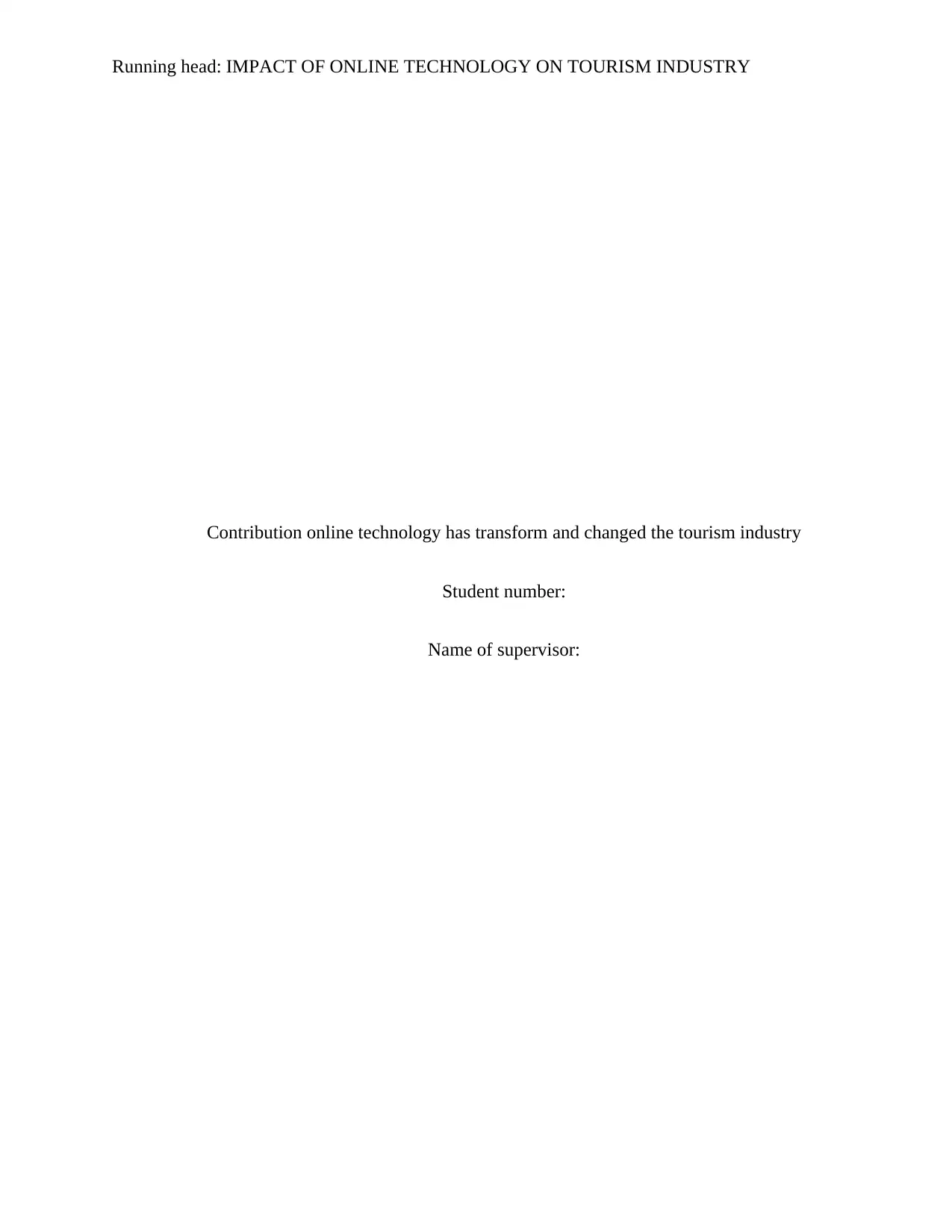
Running head: IMPACT OF ONLINE TECHNOLOGY ON TOURISM INDUSTRY
Contribution online technology has transform and changed the tourism industry
Student number:
Name of supervisor:
Contribution online technology has transform and changed the tourism industry
Student number:
Name of supervisor:
Paraphrase This Document
Need a fresh take? Get an instant paraphrase of this document with our AI Paraphraser
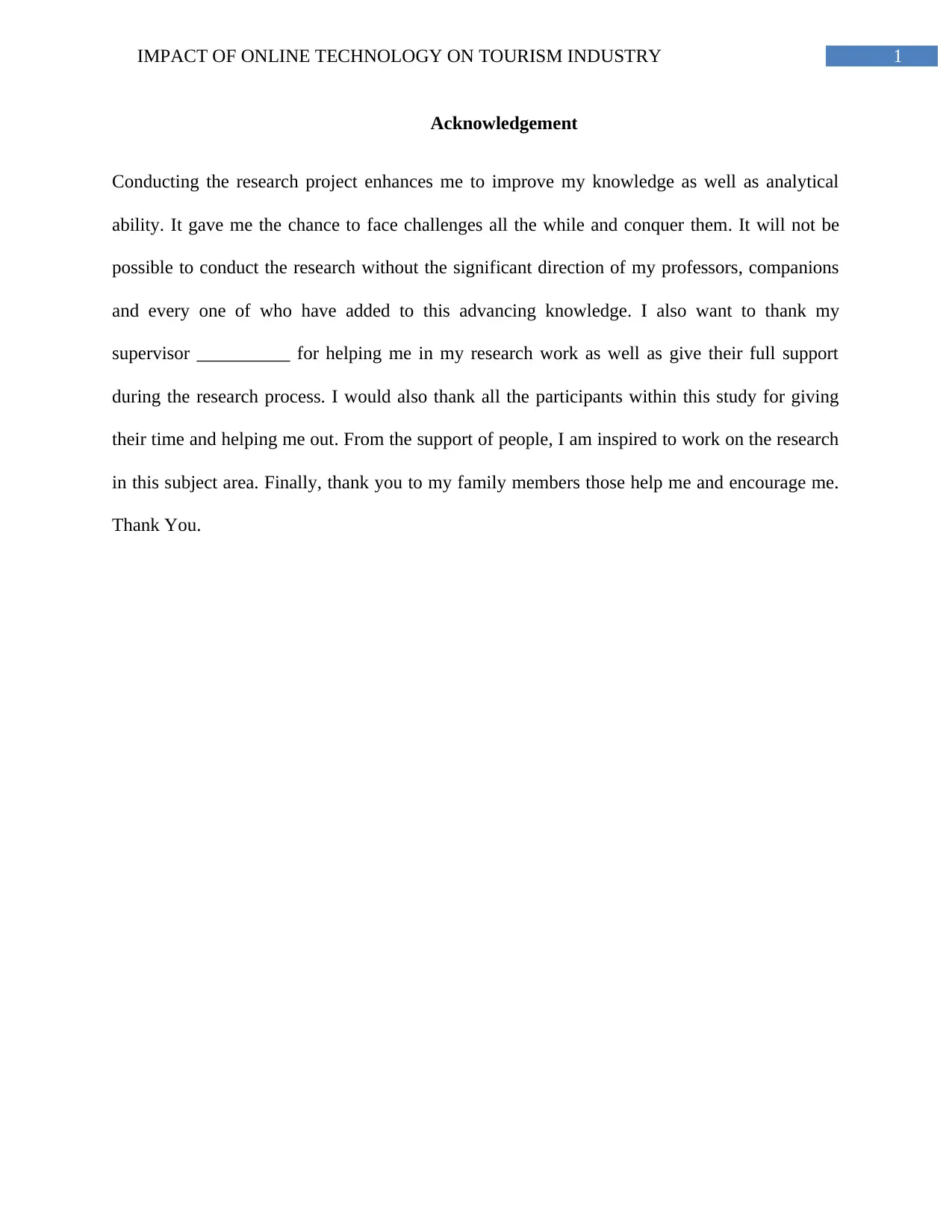
1IMPACT OF ONLINE TECHNOLOGY ON TOURISM INDUSTRY
Acknowledgement
Conducting the research project enhances me to improve my knowledge as well as analytical
ability. It gave me the chance to face challenges all the while and conquer them. It will not be
possible to conduct the research without the significant direction of my professors, companions
and every one of who have added to this advancing knowledge. I also want to thank my
supervisor __________ for helping me in my research work as well as give their full support
during the research process. I would also thank all the participants within this study for giving
their time and helping me out. From the support of people, I am inspired to work on the research
in this subject area. Finally, thank you to my family members those help me and encourage me.
Thank You.
Acknowledgement
Conducting the research project enhances me to improve my knowledge as well as analytical
ability. It gave me the chance to face challenges all the while and conquer them. It will not be
possible to conduct the research without the significant direction of my professors, companions
and every one of who have added to this advancing knowledge. I also want to thank my
supervisor __________ for helping me in my research work as well as give their full support
during the research process. I would also thank all the participants within this study for giving
their time and helping me out. From the support of people, I am inspired to work on the research
in this subject area. Finally, thank you to my family members those help me and encourage me.
Thank You.
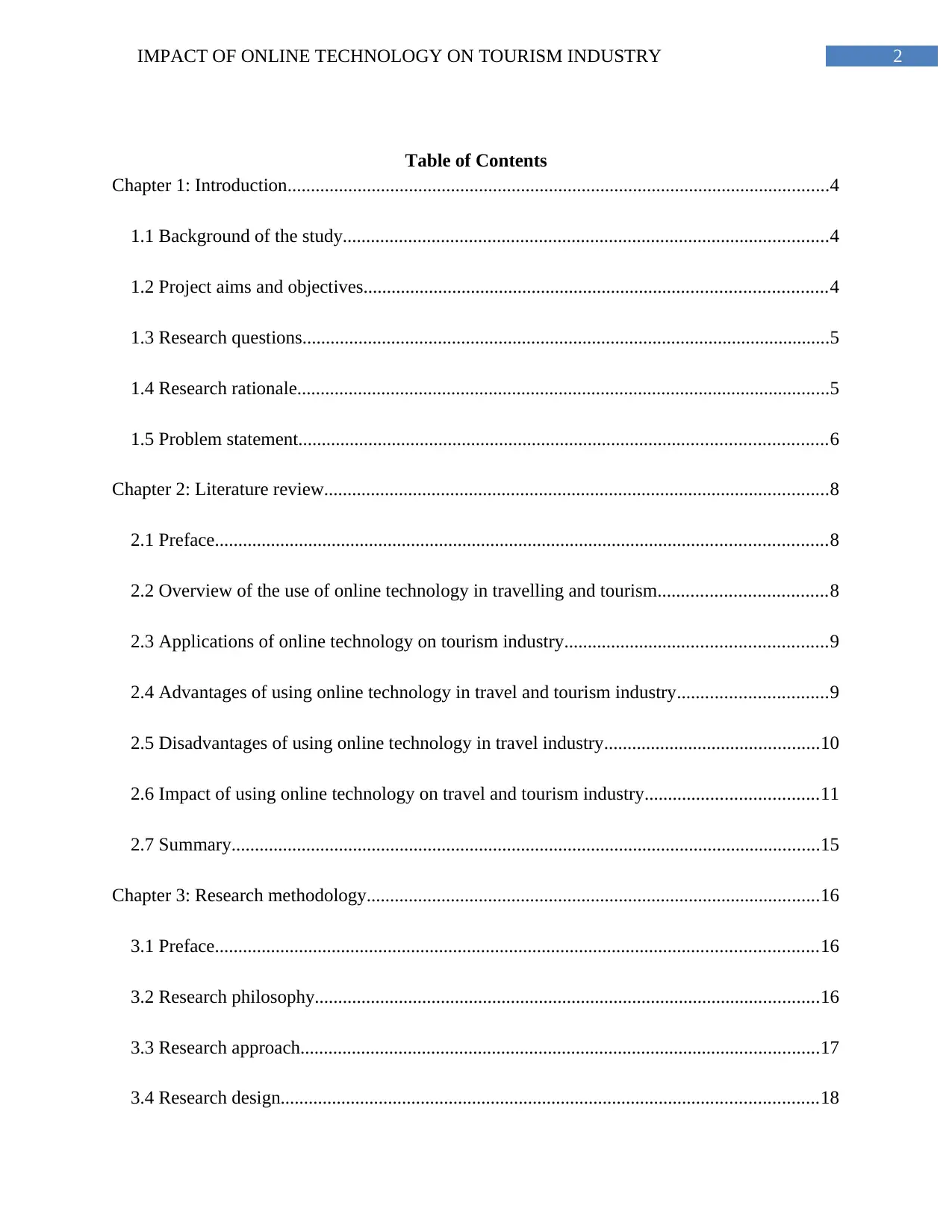
2IMPACT OF ONLINE TECHNOLOGY ON TOURISM INDUSTRY
Table of Contents
Chapter 1: Introduction....................................................................................................................4
1.1 Background of the study........................................................................................................4
1.2 Project aims and objectives...................................................................................................4
1.3 Research questions.................................................................................................................5
1.4 Research rationale..................................................................................................................5
1.5 Problem statement.................................................................................................................6
Chapter 2: Literature review............................................................................................................8
2.1 Preface...................................................................................................................................8
2.2 Overview of the use of online technology in travelling and tourism....................................8
2.3 Applications of online technology on tourism industry........................................................9
2.4 Advantages of using online technology in travel and tourism industry................................9
2.5 Disadvantages of using online technology in travel industry..............................................10
2.6 Impact of using online technology on travel and tourism industry.....................................11
2.7 Summary..............................................................................................................................15
Chapter 3: Research methodology.................................................................................................16
3.1 Preface.................................................................................................................................16
3.2 Research philosophy............................................................................................................16
3.3 Research approach...............................................................................................................17
3.4 Research design...................................................................................................................18
Table of Contents
Chapter 1: Introduction....................................................................................................................4
1.1 Background of the study........................................................................................................4
1.2 Project aims and objectives...................................................................................................4
1.3 Research questions.................................................................................................................5
1.4 Research rationale..................................................................................................................5
1.5 Problem statement.................................................................................................................6
Chapter 2: Literature review............................................................................................................8
2.1 Preface...................................................................................................................................8
2.2 Overview of the use of online technology in travelling and tourism....................................8
2.3 Applications of online technology on tourism industry........................................................9
2.4 Advantages of using online technology in travel and tourism industry................................9
2.5 Disadvantages of using online technology in travel industry..............................................10
2.6 Impact of using online technology on travel and tourism industry.....................................11
2.7 Summary..............................................................................................................................15
Chapter 3: Research methodology.................................................................................................16
3.1 Preface.................................................................................................................................16
3.2 Research philosophy............................................................................................................16
3.3 Research approach...............................................................................................................17
3.4 Research design...................................................................................................................18
⊘ This is a preview!⊘
Do you want full access?
Subscribe today to unlock all pages.

Trusted by 1+ million students worldwide
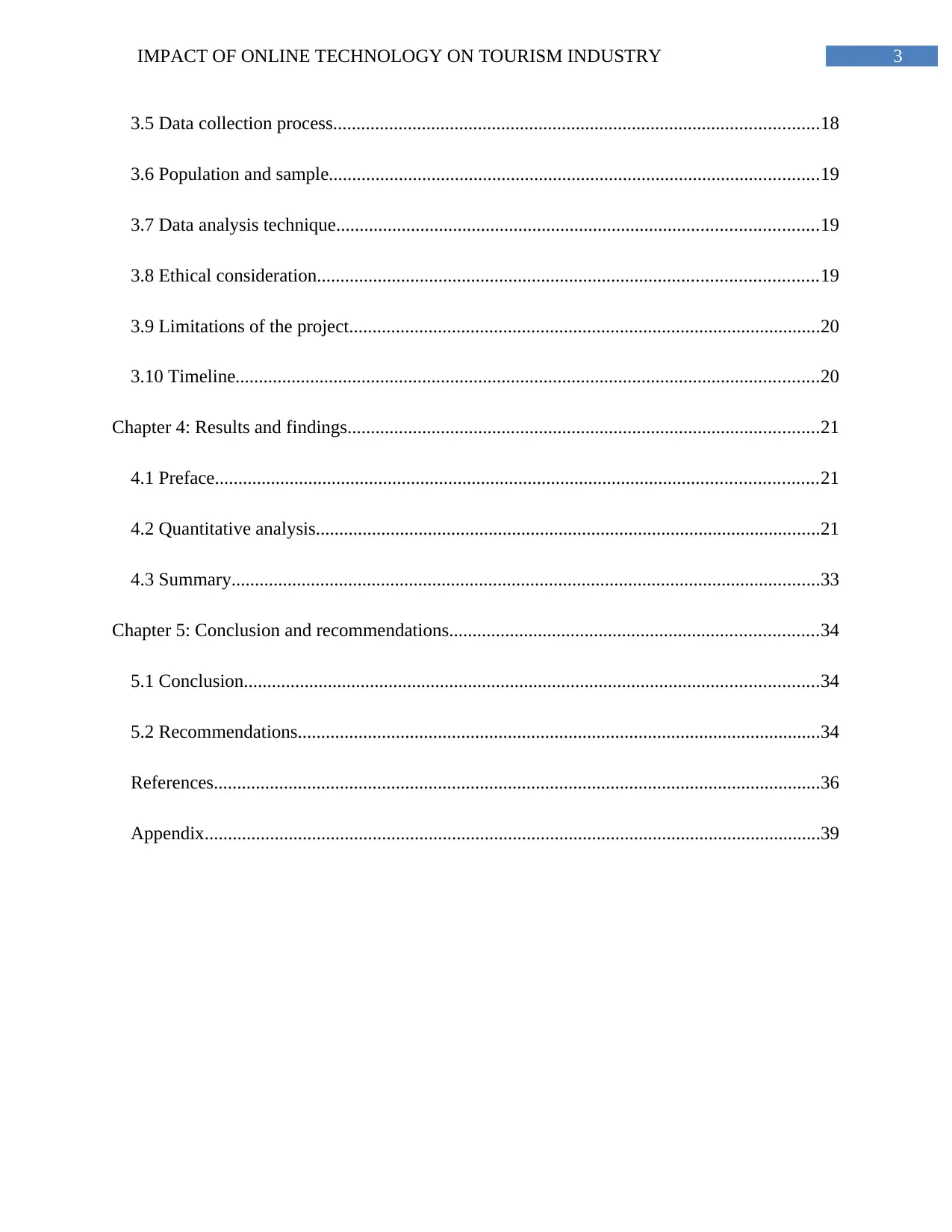
3IMPACT OF ONLINE TECHNOLOGY ON TOURISM INDUSTRY
3.5 Data collection process........................................................................................................18
3.6 Population and sample.........................................................................................................19
3.7 Data analysis technique.......................................................................................................19
3.8 Ethical consideration...........................................................................................................19
3.9 Limitations of the project.....................................................................................................20
3.10 Timeline.............................................................................................................................20
Chapter 4: Results and findings.....................................................................................................21
4.1 Preface.................................................................................................................................21
4.2 Quantitative analysis............................................................................................................21
4.3 Summary..............................................................................................................................33
Chapter 5: Conclusion and recommendations...............................................................................34
5.1 Conclusion...........................................................................................................................34
5.2 Recommendations................................................................................................................34
References..................................................................................................................................36
Appendix....................................................................................................................................39
3.5 Data collection process........................................................................................................18
3.6 Population and sample.........................................................................................................19
3.7 Data analysis technique.......................................................................................................19
3.8 Ethical consideration...........................................................................................................19
3.9 Limitations of the project.....................................................................................................20
3.10 Timeline.............................................................................................................................20
Chapter 4: Results and findings.....................................................................................................21
4.1 Preface.................................................................................................................................21
4.2 Quantitative analysis............................................................................................................21
4.3 Summary..............................................................................................................................33
Chapter 5: Conclusion and recommendations...............................................................................34
5.1 Conclusion...........................................................................................................................34
5.2 Recommendations................................................................................................................34
References..................................................................................................................................36
Appendix....................................................................................................................................39
Paraphrase This Document
Need a fresh take? Get an instant paraphrase of this document with our AI Paraphraser
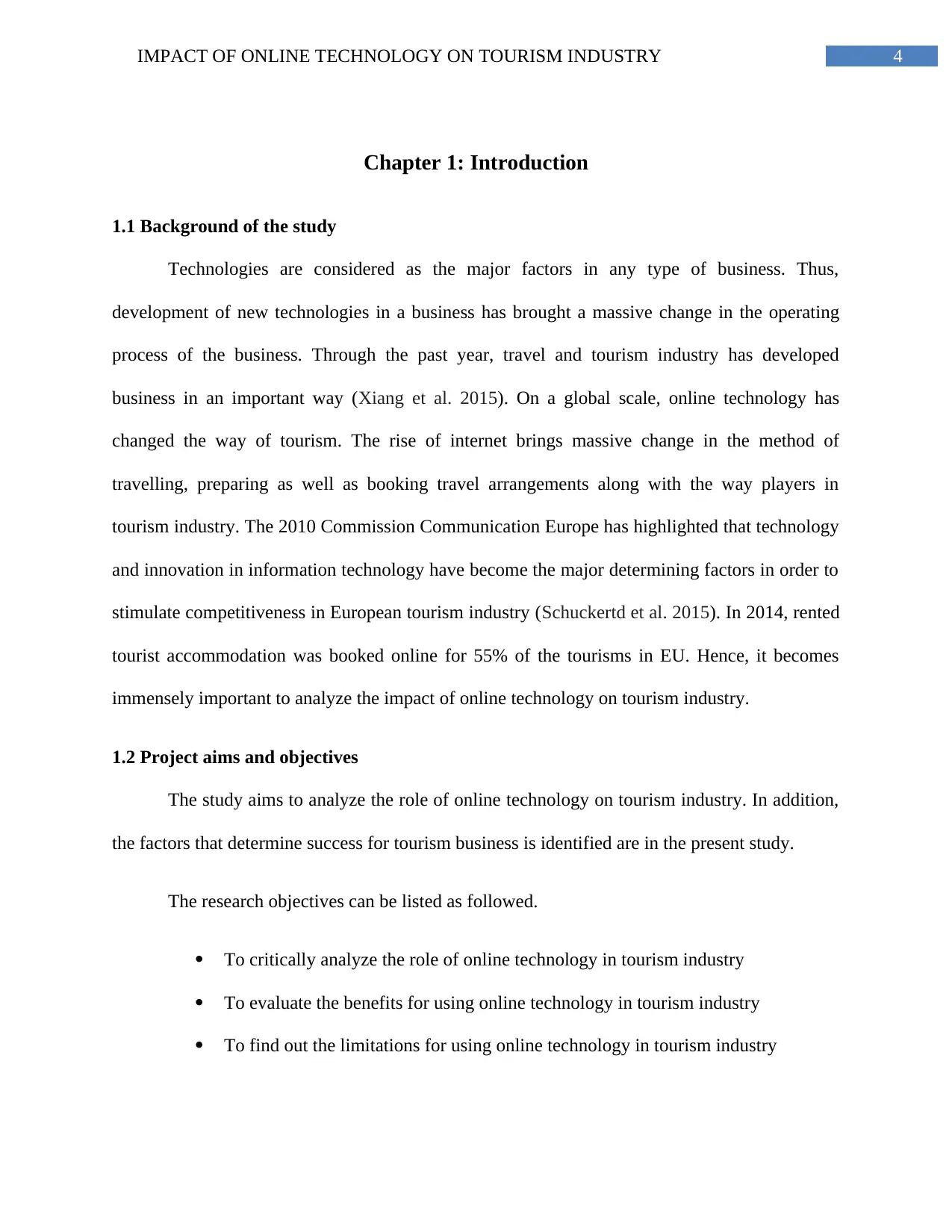
4IMPACT OF ONLINE TECHNOLOGY ON TOURISM INDUSTRY
Chapter 1: Introduction
1.1 Background of the study
Technologies are considered as the major factors in any type of business. Thus,
development of new technologies in a business has brought a massive change in the operating
process of the business. Through the past year, travel and tourism industry has developed
business in an important way (Xiang et al. 2015). On a global scale, online technology has
changed the way of tourism. The rise of internet brings massive change in the method of
travelling, preparing as well as booking travel arrangements along with the way players in
tourism industry. The 2010 Commission Communication Europe has highlighted that technology
and innovation in information technology have become the major determining factors in order to
stimulate competitiveness in European tourism industry (Schuckertd et al. 2015). In 2014, rented
tourist accommodation was booked online for 55% of the tourisms in EU. Hence, it becomes
immensely important to analyze the impact of online technology on tourism industry.
1.2 Project aims and objectives
The study aims to analyze the role of online technology on tourism industry. In addition,
the factors that determine success for tourism business is identified are in the present study.
The research objectives can be listed as followed.
To critically analyze the role of online technology in tourism industry
To evaluate the benefits for using online technology in tourism industry
To find out the limitations for using online technology in tourism industry
Chapter 1: Introduction
1.1 Background of the study
Technologies are considered as the major factors in any type of business. Thus,
development of new technologies in a business has brought a massive change in the operating
process of the business. Through the past year, travel and tourism industry has developed
business in an important way (Xiang et al. 2015). On a global scale, online technology has
changed the way of tourism. The rise of internet brings massive change in the method of
travelling, preparing as well as booking travel arrangements along with the way players in
tourism industry. The 2010 Commission Communication Europe has highlighted that technology
and innovation in information technology have become the major determining factors in order to
stimulate competitiveness in European tourism industry (Schuckertd et al. 2015). In 2014, rented
tourist accommodation was booked online for 55% of the tourisms in EU. Hence, it becomes
immensely important to analyze the impact of online technology on tourism industry.
1.2 Project aims and objectives
The study aims to analyze the role of online technology on tourism industry. In addition,
the factors that determine success for tourism business is identified are in the present study.
The research objectives can be listed as followed.
To critically analyze the role of online technology in tourism industry
To evaluate the benefits for using online technology in tourism industry
To find out the limitations for using online technology in tourism industry
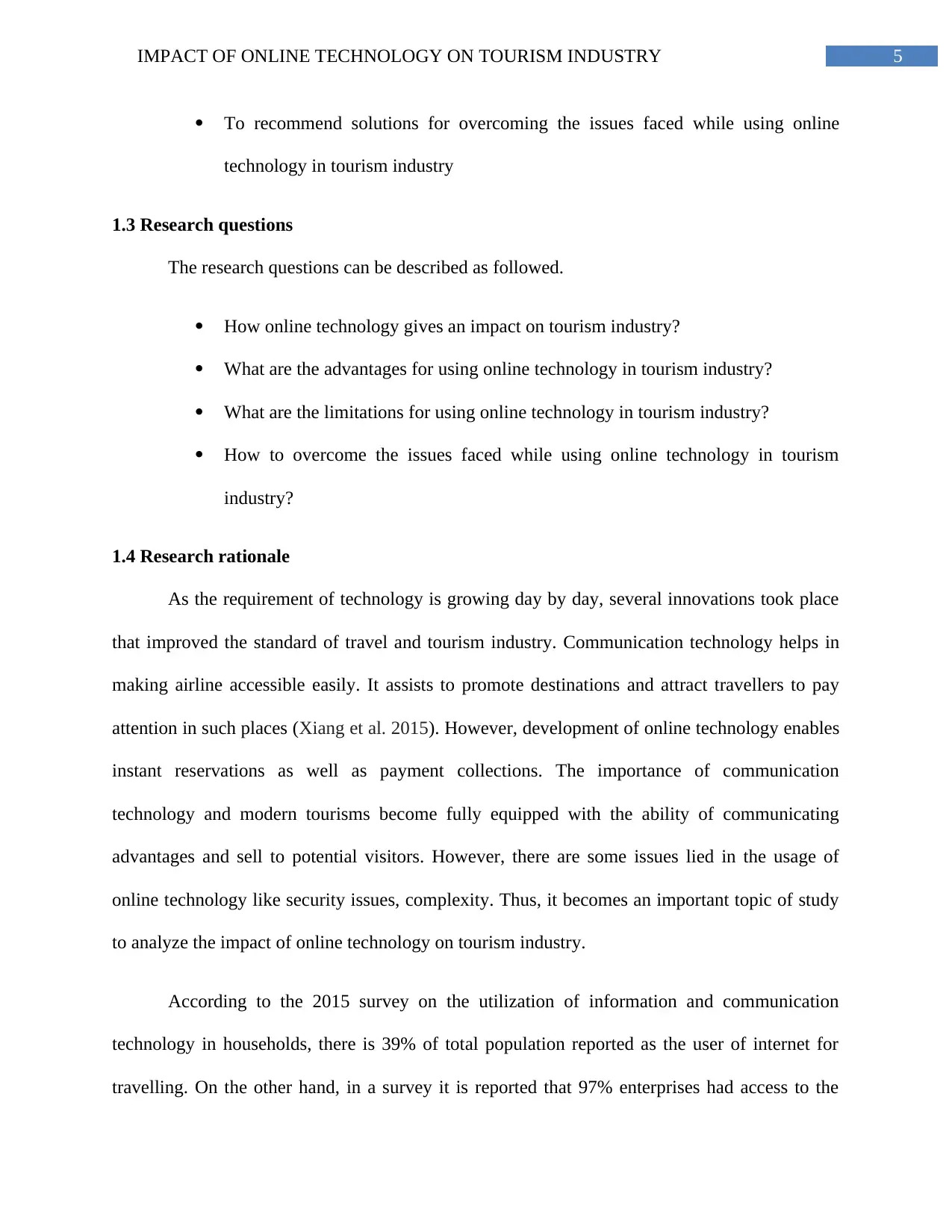
5IMPACT OF ONLINE TECHNOLOGY ON TOURISM INDUSTRY
To recommend solutions for overcoming the issues faced while using online
technology in tourism industry
1.3 Research questions
The research questions can be described as followed.
How online technology gives an impact on tourism industry?
What are the advantages for using online technology in tourism industry?
What are the limitations for using online technology in tourism industry?
How to overcome the issues faced while using online technology in tourism
industry?
1.4 Research rationale
As the requirement of technology is growing day by day, several innovations took place
that improved the standard of travel and tourism industry. Communication technology helps in
making airline accessible easily. It assists to promote destinations and attract travellers to pay
attention in such places (Xiang et al. 2015). However, development of online technology enables
instant reservations as well as payment collections. The importance of communication
technology and modern tourisms become fully equipped with the ability of communicating
advantages and sell to potential visitors. However, there are some issues lied in the usage of
online technology like security issues, complexity. Thus, it becomes an important topic of study
to analyze the impact of online technology on tourism industry.
According to the 2015 survey on the utilization of information and communication
technology in households, there is 39% of total population reported as the user of internet for
travelling. On the other hand, in a survey it is reported that 97% enterprises had access to the
To recommend solutions for overcoming the issues faced while using online
technology in tourism industry
1.3 Research questions
The research questions can be described as followed.
How online technology gives an impact on tourism industry?
What are the advantages for using online technology in tourism industry?
What are the limitations for using online technology in tourism industry?
How to overcome the issues faced while using online technology in tourism
industry?
1.4 Research rationale
As the requirement of technology is growing day by day, several innovations took place
that improved the standard of travel and tourism industry. Communication technology helps in
making airline accessible easily. It assists to promote destinations and attract travellers to pay
attention in such places (Xiang et al. 2015). However, development of online technology enables
instant reservations as well as payment collections. The importance of communication
technology and modern tourisms become fully equipped with the ability of communicating
advantages and sell to potential visitors. However, there are some issues lied in the usage of
online technology like security issues, complexity. Thus, it becomes an important topic of study
to analyze the impact of online technology on tourism industry.
According to the 2015 survey on the utilization of information and communication
technology in households, there is 39% of total population reported as the user of internet for
travelling. On the other hand, in a survey it is reported that 97% enterprises had access to the
⊘ This is a preview!⊘
Do you want full access?
Subscribe today to unlock all pages.

Trusted by 1+ million students worldwide
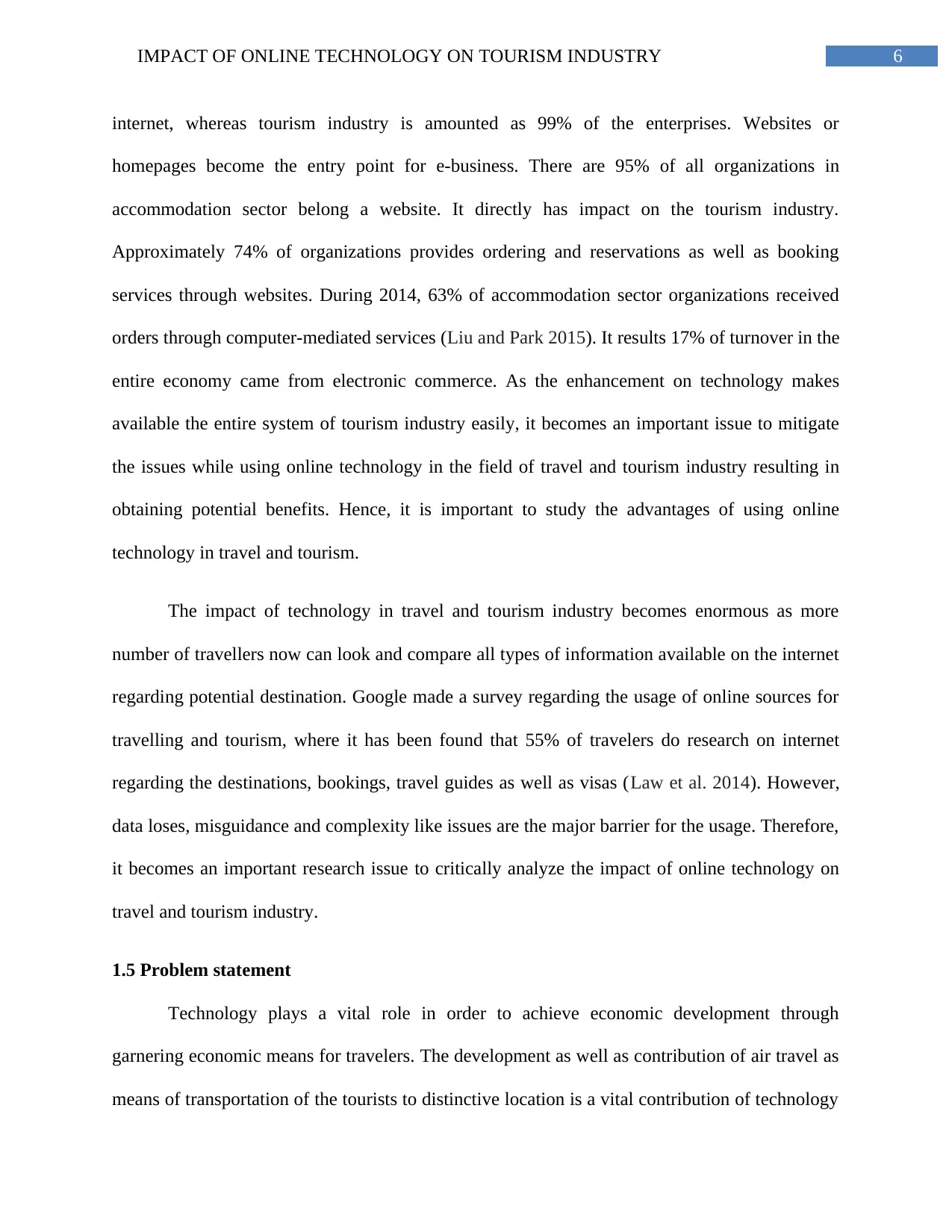
6IMPACT OF ONLINE TECHNOLOGY ON TOURISM INDUSTRY
internet, whereas tourism industry is amounted as 99% of the enterprises. Websites or
homepages become the entry point for e-business. There are 95% of all organizations in
accommodation sector belong a website. It directly has impact on the tourism industry.
Approximately 74% of organizations provides ordering and reservations as well as booking
services through websites. During 2014, 63% of accommodation sector organizations received
orders through computer-mediated services (Liu and Park 2015). It results 17% of turnover in the
entire economy came from electronic commerce. As the enhancement on technology makes
available the entire system of tourism industry easily, it becomes an important issue to mitigate
the issues while using online technology in the field of travel and tourism industry resulting in
obtaining potential benefits. Hence, it is important to study the advantages of using online
technology in travel and tourism.
The impact of technology in travel and tourism industry becomes enormous as more
number of travellers now can look and compare all types of information available on the internet
regarding potential destination. Google made a survey regarding the usage of online sources for
travelling and tourism, where it has been found that 55% of travelers do research on internet
regarding the destinations, bookings, travel guides as well as visas (Law et al. 2014). However,
data loses, misguidance and complexity like issues are the major barrier for the usage. Therefore,
it becomes an important research issue to critically analyze the impact of online technology on
travel and tourism industry.
1.5 Problem statement
Technology plays a vital role in order to achieve economic development through
garnering economic means for travelers. The development as well as contribution of air travel as
means of transportation of the tourists to distinctive location is a vital contribution of technology
internet, whereas tourism industry is amounted as 99% of the enterprises. Websites or
homepages become the entry point for e-business. There are 95% of all organizations in
accommodation sector belong a website. It directly has impact on the tourism industry.
Approximately 74% of organizations provides ordering and reservations as well as booking
services through websites. During 2014, 63% of accommodation sector organizations received
orders through computer-mediated services (Liu and Park 2015). It results 17% of turnover in the
entire economy came from electronic commerce. As the enhancement on technology makes
available the entire system of tourism industry easily, it becomes an important issue to mitigate
the issues while using online technology in the field of travel and tourism industry resulting in
obtaining potential benefits. Hence, it is important to study the advantages of using online
technology in travel and tourism.
The impact of technology in travel and tourism industry becomes enormous as more
number of travellers now can look and compare all types of information available on the internet
regarding potential destination. Google made a survey regarding the usage of online sources for
travelling and tourism, where it has been found that 55% of travelers do research on internet
regarding the destinations, bookings, travel guides as well as visas (Law et al. 2014). However,
data loses, misguidance and complexity like issues are the major barrier for the usage. Therefore,
it becomes an important research issue to critically analyze the impact of online technology on
travel and tourism industry.
1.5 Problem statement
Technology plays a vital role in order to achieve economic development through
garnering economic means for travelers. The development as well as contribution of air travel as
means of transportation of the tourists to distinctive location is a vital contribution of technology
Paraphrase This Document
Need a fresh take? Get an instant paraphrase of this document with our AI Paraphraser
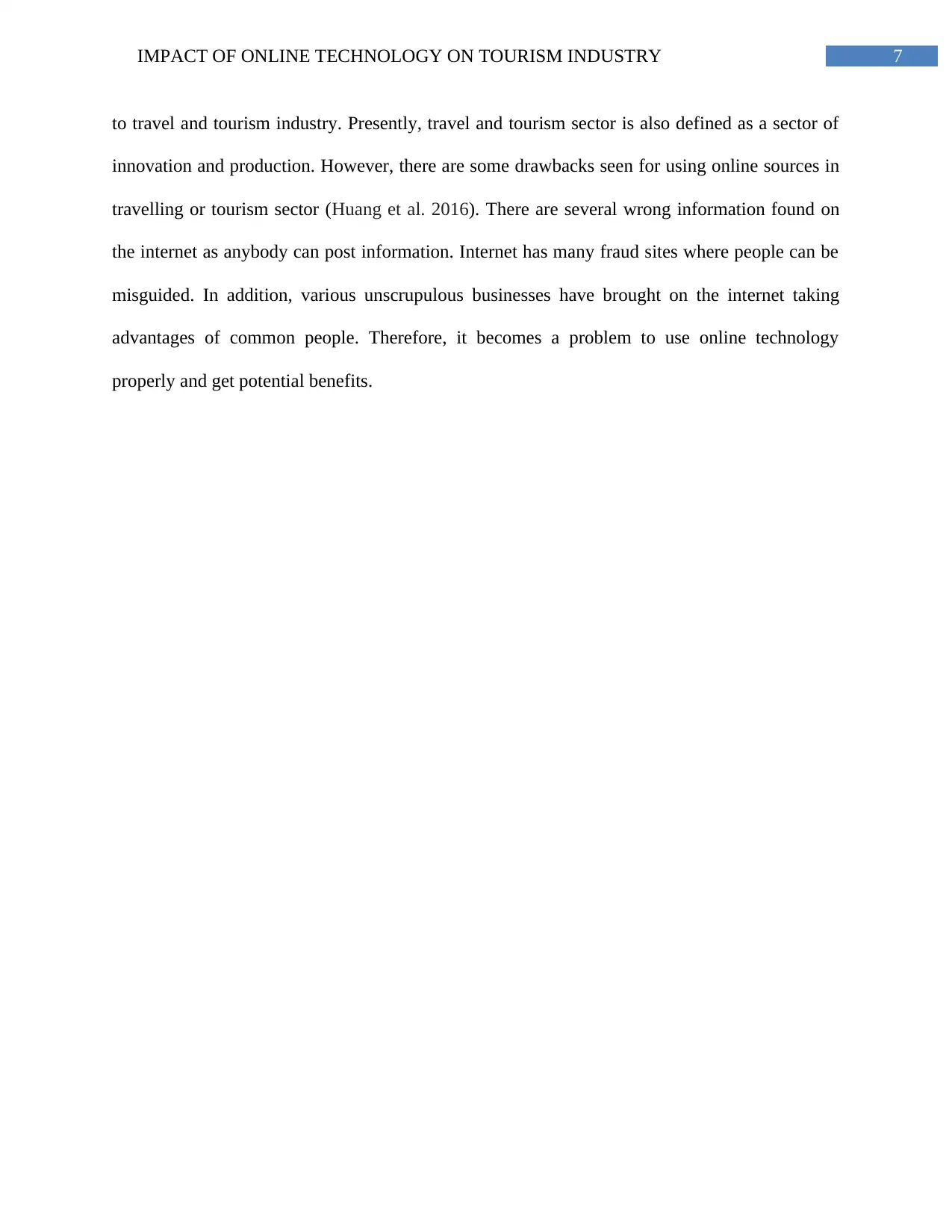
7IMPACT OF ONLINE TECHNOLOGY ON TOURISM INDUSTRY
to travel and tourism industry. Presently, travel and tourism sector is also defined as a sector of
innovation and production. However, there are some drawbacks seen for using online sources in
travelling or tourism sector (Huang et al. 2016). There are several wrong information found on
the internet as anybody can post information. Internet has many fraud sites where people can be
misguided. In addition, various unscrupulous businesses have brought on the internet taking
advantages of common people. Therefore, it becomes a problem to use online technology
properly and get potential benefits.
to travel and tourism industry. Presently, travel and tourism sector is also defined as a sector of
innovation and production. However, there are some drawbacks seen for using online sources in
travelling or tourism sector (Huang et al. 2016). There are several wrong information found on
the internet as anybody can post information. Internet has many fraud sites where people can be
misguided. In addition, various unscrupulous businesses have brought on the internet taking
advantages of common people. Therefore, it becomes a problem to use online technology
properly and get potential benefits.
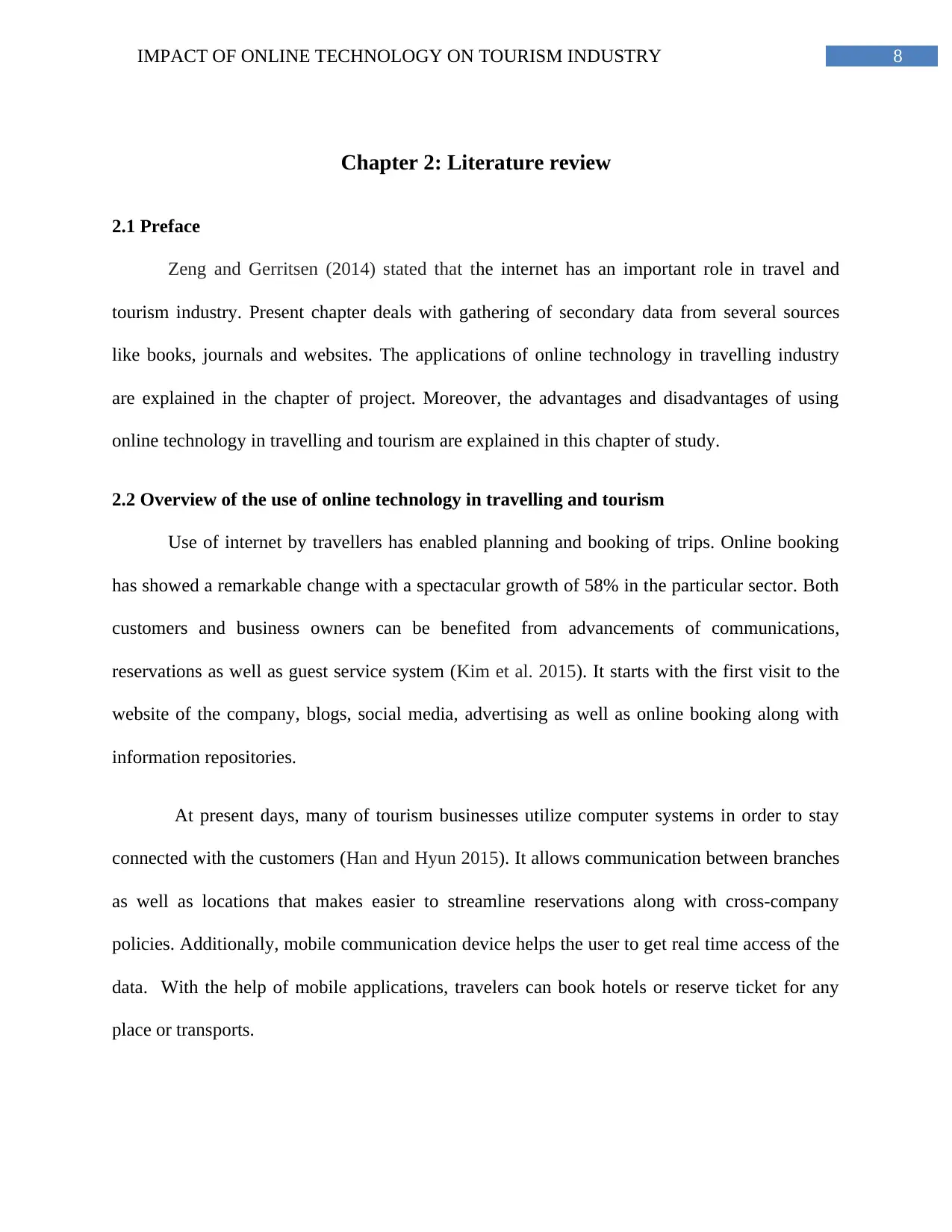
8IMPACT OF ONLINE TECHNOLOGY ON TOURISM INDUSTRY
Chapter 2: Literature review
2.1 Preface
Zeng and Gerritsen (2014) stated that the internet has an important role in travel and
tourism industry. Present chapter deals with gathering of secondary data from several sources
like books, journals and websites. The applications of online technology in travelling industry
are explained in the chapter of project. Moreover, the advantages and disadvantages of using
online technology in travelling and tourism are explained in this chapter of study.
2.2 Overview of the use of online technology in travelling and tourism
Use of internet by travellers has enabled planning and booking of trips. Online booking
has showed a remarkable change with a spectacular growth of 58% in the particular sector. Both
customers and business owners can be benefited from advancements of communications,
reservations as well as guest service system (Kim et al. 2015). It starts with the first visit to the
website of the company, blogs, social media, advertising as well as online booking along with
information repositories.
At present days, many of tourism businesses utilize computer systems in order to stay
connected with the customers (Han and Hyun 2015). It allows communication between branches
as well as locations that makes easier to streamline reservations along with cross-company
policies. Additionally, mobile communication device helps the user to get real time access of the
data. With the help of mobile applications, travelers can book hotels or reserve ticket for any
place or transports.
Chapter 2: Literature review
2.1 Preface
Zeng and Gerritsen (2014) stated that the internet has an important role in travel and
tourism industry. Present chapter deals with gathering of secondary data from several sources
like books, journals and websites. The applications of online technology in travelling industry
are explained in the chapter of project. Moreover, the advantages and disadvantages of using
online technology in travelling and tourism are explained in this chapter of study.
2.2 Overview of the use of online technology in travelling and tourism
Use of internet by travellers has enabled planning and booking of trips. Online booking
has showed a remarkable change with a spectacular growth of 58% in the particular sector. Both
customers and business owners can be benefited from advancements of communications,
reservations as well as guest service system (Kim et al. 2015). It starts with the first visit to the
website of the company, blogs, social media, advertising as well as online booking along with
information repositories.
At present days, many of tourism businesses utilize computer systems in order to stay
connected with the customers (Han and Hyun 2015). It allows communication between branches
as well as locations that makes easier to streamline reservations along with cross-company
policies. Additionally, mobile communication device helps the user to get real time access of the
data. With the help of mobile applications, travelers can book hotels or reserve ticket for any
place or transports.
⊘ This is a preview!⊘
Do you want full access?
Subscribe today to unlock all pages.

Trusted by 1+ million students worldwide
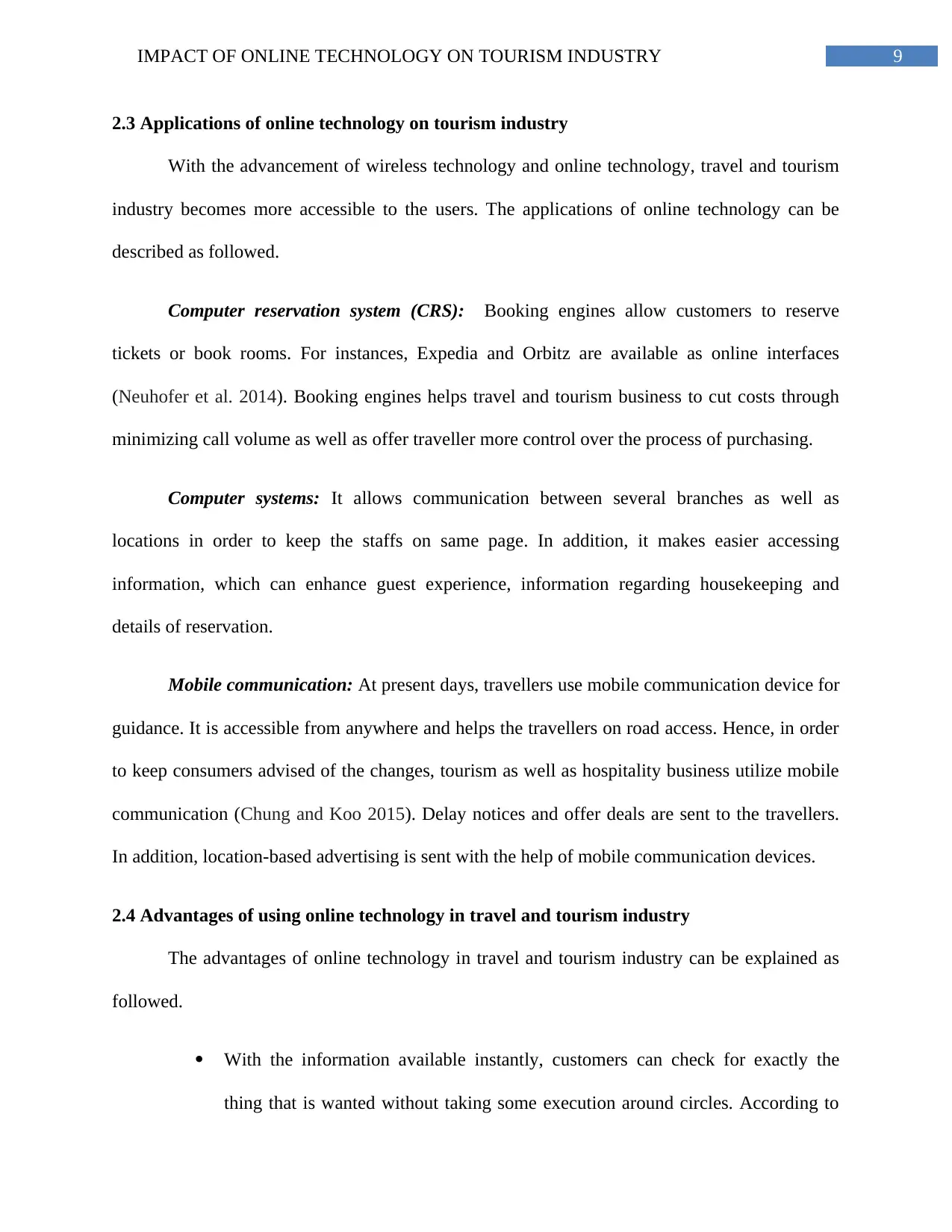
9IMPACT OF ONLINE TECHNOLOGY ON TOURISM INDUSTRY
2.3 Applications of online technology on tourism industry
With the advancement of wireless technology and online technology, travel and tourism
industry becomes more accessible to the users. The applications of online technology can be
described as followed.
Computer reservation system (CRS): Booking engines allow customers to reserve
tickets or book rooms. For instances, Expedia and Orbitz are available as online interfaces
(Neuhofer et al. 2014). Booking engines helps travel and tourism business to cut costs through
minimizing call volume as well as offer traveller more control over the process of purchasing.
Computer systems: It allows communication between several branches as well as
locations in order to keep the staffs on same page. In addition, it makes easier accessing
information, which can enhance guest experience, information regarding housekeeping and
details of reservation.
Mobile communication: At present days, travellers use mobile communication device for
guidance. It is accessible from anywhere and helps the travellers on road access. Hence, in order
to keep consumers advised of the changes, tourism as well as hospitality business utilize mobile
communication (Chung and Koo 2015). Delay notices and offer deals are sent to the travellers.
In addition, location-based advertising is sent with the help of mobile communication devices.
2.4 Advantages of using online technology in travel and tourism industry
The advantages of online technology in travel and tourism industry can be explained as
followed.
With the information available instantly, customers can check for exactly the
thing that is wanted without taking some execution around circles. According to
2.3 Applications of online technology on tourism industry
With the advancement of wireless technology and online technology, travel and tourism
industry becomes more accessible to the users. The applications of online technology can be
described as followed.
Computer reservation system (CRS): Booking engines allow customers to reserve
tickets or book rooms. For instances, Expedia and Orbitz are available as online interfaces
(Neuhofer et al. 2014). Booking engines helps travel and tourism business to cut costs through
minimizing call volume as well as offer traveller more control over the process of purchasing.
Computer systems: It allows communication between several branches as well as
locations in order to keep the staffs on same page. In addition, it makes easier accessing
information, which can enhance guest experience, information regarding housekeeping and
details of reservation.
Mobile communication: At present days, travellers use mobile communication device for
guidance. It is accessible from anywhere and helps the travellers on road access. Hence, in order
to keep consumers advised of the changes, tourism as well as hospitality business utilize mobile
communication (Chung and Koo 2015). Delay notices and offer deals are sent to the travellers.
In addition, location-based advertising is sent with the help of mobile communication devices.
2.4 Advantages of using online technology in travel and tourism industry
The advantages of online technology in travel and tourism industry can be explained as
followed.
With the information available instantly, customers can check for exactly the
thing that is wanted without taking some execution around circles. According to
Paraphrase This Document
Need a fresh take? Get an instant paraphrase of this document with our AI Paraphraser
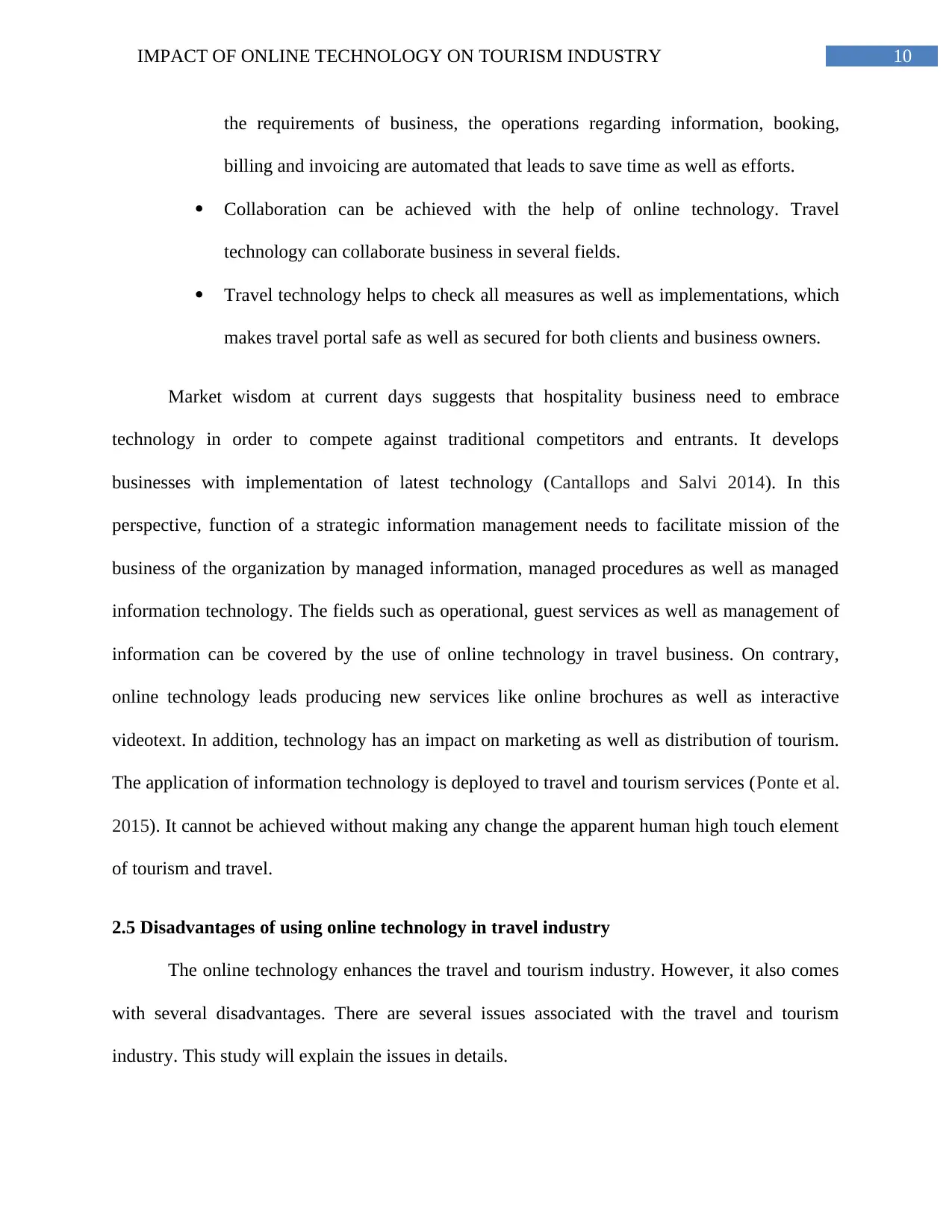
10IMPACT OF ONLINE TECHNOLOGY ON TOURISM INDUSTRY
the requirements of business, the operations regarding information, booking,
billing and invoicing are automated that leads to save time as well as efforts.
Collaboration can be achieved with the help of online technology. Travel
technology can collaborate business in several fields.
Travel technology helps to check all measures as well as implementations, which
makes travel portal safe as well as secured for both clients and business owners.
Market wisdom at current days suggests that hospitality business need to embrace
technology in order to compete against traditional competitors and entrants. It develops
businesses with implementation of latest technology (Cantallops and Salvi 2014). In this
perspective, function of a strategic information management needs to facilitate mission of the
business of the organization by managed information, managed procedures as well as managed
information technology. The fields such as operational, guest services as well as management of
information can be covered by the use of online technology in travel business. On contrary,
online technology leads producing new services like online brochures as well as interactive
videotext. In addition, technology has an impact on marketing as well as distribution of tourism.
The application of information technology is deployed to travel and tourism services (Ponte et al.
2015). It cannot be achieved without making any change the apparent human high touch element
of tourism and travel.
2.5 Disadvantages of using online technology in travel industry
The online technology enhances the travel and tourism industry. However, it also comes
with several disadvantages. There are several issues associated with the travel and tourism
industry. This study will explain the issues in details.
the requirements of business, the operations regarding information, booking,
billing and invoicing are automated that leads to save time as well as efforts.
Collaboration can be achieved with the help of online technology. Travel
technology can collaborate business in several fields.
Travel technology helps to check all measures as well as implementations, which
makes travel portal safe as well as secured for both clients and business owners.
Market wisdom at current days suggests that hospitality business need to embrace
technology in order to compete against traditional competitors and entrants. It develops
businesses with implementation of latest technology (Cantallops and Salvi 2014). In this
perspective, function of a strategic information management needs to facilitate mission of the
business of the organization by managed information, managed procedures as well as managed
information technology. The fields such as operational, guest services as well as management of
information can be covered by the use of online technology in travel business. On contrary,
online technology leads producing new services like online brochures as well as interactive
videotext. In addition, technology has an impact on marketing as well as distribution of tourism.
The application of information technology is deployed to travel and tourism services (Ponte et al.
2015). It cannot be achieved without making any change the apparent human high touch element
of tourism and travel.
2.5 Disadvantages of using online technology in travel industry
The online technology enhances the travel and tourism industry. However, it also comes
with several disadvantages. There are several issues associated with the travel and tourism
industry. This study will explain the issues in details.
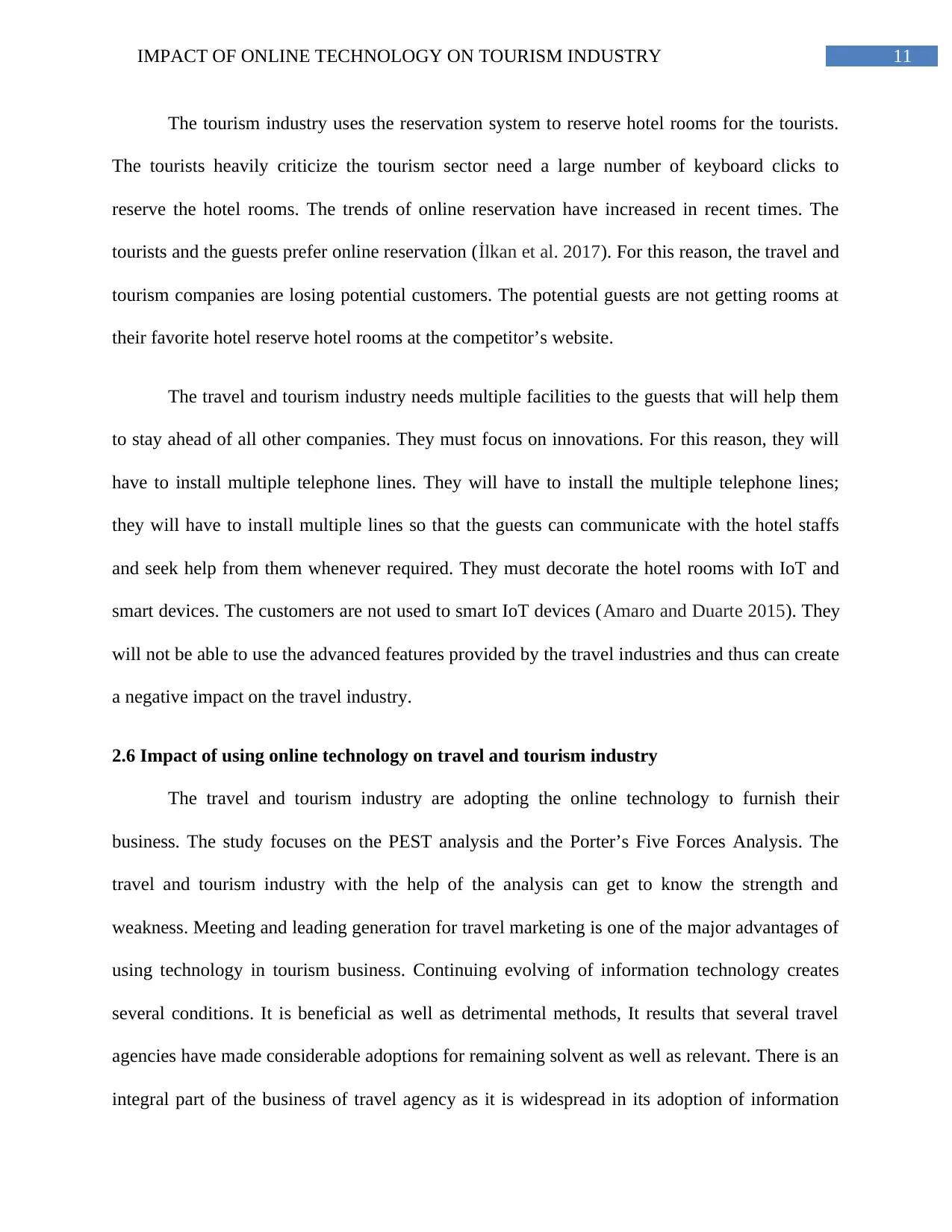
11IMPACT OF ONLINE TECHNOLOGY ON TOURISM INDUSTRY
The tourism industry uses the reservation system to reserve hotel rooms for the tourists.
The tourists heavily criticize the tourism sector need a large number of keyboard clicks to
reserve the hotel rooms. The trends of online reservation have increased in recent times. The
tourists and the guests prefer online reservation (İlkan et al. 2017). For this reason, the travel and
tourism companies are losing potential customers. The potential guests are not getting rooms at
their favorite hotel reserve hotel rooms at the competitor’s website.
The travel and tourism industry needs multiple facilities to the guests that will help them
to stay ahead of all other companies. They must focus on innovations. For this reason, they will
have to install multiple telephone lines. They will have to install the multiple telephone lines;
they will have to install multiple lines so that the guests can communicate with the hotel staffs
and seek help from them whenever required. They must decorate the hotel rooms with IoT and
smart devices. The customers are not used to smart IoT devices (Amaro and Duarte 2015). They
will not be able to use the advanced features provided by the travel industries and thus can create
a negative impact on the travel industry.
2.6 Impact of using online technology on travel and tourism industry
The travel and tourism industry are adopting the online technology to furnish their
business. The study focuses on the PEST analysis and the Porter’s Five Forces Analysis. The
travel and tourism industry with the help of the analysis can get to know the strength and
weakness. Meeting and leading generation for travel marketing is one of the major advantages of
using technology in tourism business. Continuing evolving of information technology creates
several conditions. It is beneficial as well as detrimental methods, It results that several travel
agencies have made considerable adoptions for remaining solvent as well as relevant. There is an
integral part of the business of travel agency as it is widespread in its adoption of information
The tourism industry uses the reservation system to reserve hotel rooms for the tourists.
The tourists heavily criticize the tourism sector need a large number of keyboard clicks to
reserve the hotel rooms. The trends of online reservation have increased in recent times. The
tourists and the guests prefer online reservation (İlkan et al. 2017). For this reason, the travel and
tourism companies are losing potential customers. The potential guests are not getting rooms at
their favorite hotel reserve hotel rooms at the competitor’s website.
The travel and tourism industry needs multiple facilities to the guests that will help them
to stay ahead of all other companies. They must focus on innovations. For this reason, they will
have to install multiple telephone lines. They will have to install the multiple telephone lines;
they will have to install multiple lines so that the guests can communicate with the hotel staffs
and seek help from them whenever required. They must decorate the hotel rooms with IoT and
smart devices. The customers are not used to smart IoT devices (Amaro and Duarte 2015). They
will not be able to use the advanced features provided by the travel industries and thus can create
a negative impact on the travel industry.
2.6 Impact of using online technology on travel and tourism industry
The travel and tourism industry are adopting the online technology to furnish their
business. The study focuses on the PEST analysis and the Porter’s Five Forces Analysis. The
travel and tourism industry with the help of the analysis can get to know the strength and
weakness. Meeting and leading generation for travel marketing is one of the major advantages of
using technology in tourism business. Continuing evolving of information technology creates
several conditions. It is beneficial as well as detrimental methods, It results that several travel
agencies have made considerable adoptions for remaining solvent as well as relevant. There is an
integral part of the business of travel agency as it is widespread in its adoption of information
⊘ This is a preview!⊘
Do you want full access?
Subscribe today to unlock all pages.

Trusted by 1+ million students worldwide
1 out of 40
Related Documents
Your All-in-One AI-Powered Toolkit for Academic Success.
+13062052269
info@desklib.com
Available 24*7 on WhatsApp / Email
![[object Object]](/_next/static/media/star-bottom.7253800d.svg)
Unlock your academic potential
Copyright © 2020–2026 A2Z Services. All Rights Reserved. Developed and managed by ZUCOL.





